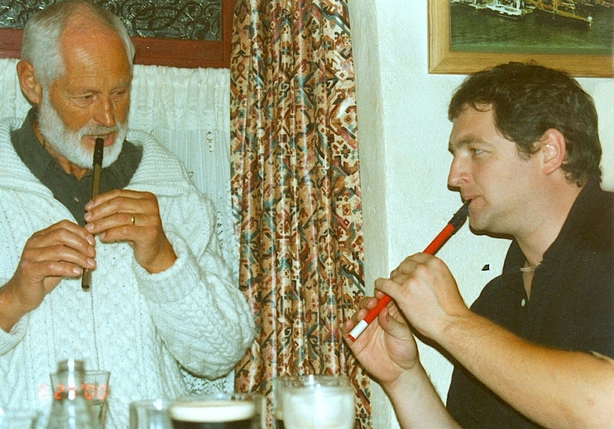As a two-part Rolling Wave special on RTÉ Radio 1 celebrates the centenary of the birth of Séamus Ennis, Ronan Browne writes for Culture about the friendship between his father, renowned psychiatrist Ivor Browne, and legendary musician, singer and folklore collector and broadcaster Séamus.
Listen to the first part of the Roling Wave special:
We need your consent to load this rte-player contentWe use rte-player to manage extra content that can set cookies on your device and collect data about your activity. Please review their details and accept them to load the content.Manage Preferences
Below, Ronan recalls his father Ivor's first encounter with Séamus in London, and the close bond that developed between them. Also: Enjoy a selection of performances from the Rolling Wave special...
A more unexpected pair it would be hard to imagine: the spirituous, multilingual musician, collector and raconteur, alongside the buzzing, incapable-of-drinking, fast-talking, bare-footed rebel shrink. But firm friends they were – two unlikely pals who respected each other deeply and relished time spent together. Born ten years apart, in 1919 and ’29, Séamus Ennis and Ivor Browne didn’t cross paths till the late 50s but remained in close contact until Séamus’ all-too-early death.
Watch: Ronan Browne & Sorcha Ní Scolaí perform The Bucks of Oranmore live at The Seamus Ennis Centre:
We need your consent to load this rte-player contentWe use rte-player to manage extra content that can set cookies on your device and collect data about your activity. Please review their details and accept them to load the content.Manage Preferences
In late 1950s London, Séamus Ennis was finishing up his tenure as roving collector and weekly presenter with the BBC’s Light Programme service. As I Roved Out had been an unexpected smash hit, possibly because it was broadcast at 10.30 on Sunday mornings, directly before Wilfred Pickles’ massively popular rural quiz Have a Go, which boasted an estimated 20 million weekly listeners.
A more unexpected pair it would be hard to imagine: the spirituous, multilingual musician, collector and raconteur, alongside the buzzing, incapable-of-drinking, fast-talking, bare-footed rebel shrink.
Having spent a mid-50s period in The Warneford Hospital, Oxford, as a young, recently qualified doctor, Ivor Browne returned to England in the late 50s, this time to London, and began working in Marlborough Day Hospital under Dr. Joshua Bierer, the Austrian maverick pioneer of social psychiatry. Bierer, more than almost anyone else, was a transforming influence on Ivor.
Watch: Sorcha Ní Scolaí performs Jenny's Welcome to Charlie and Rakish Paddy live at The Seamus Ennis Centre:
We need your consent to load this rte-player contentWe use rte-player to manage extra content that can set cookies on your device and collect data about your activity. Please review their details and accept them to load the content.Manage Preferences
Séamus Ennis remembered his London years as some of the happiest of his life, and it was towards the end of this time that he and Ivor met. Having collected all over England, Scotland and Wales, Séamus was finding it difficult to discover new musical informants. Both Séamus and the BBC knew the writing was on the wall, and by the time Denis Murphy introduced him to Ivor, Séamus was in ill-health, work was intermittent, and his marriage was failing.

Seeing the poor state that Séamus was in, Ivor immediately brought him in to the Marlborough Day hospital and hooked him up to a Parentrovite drip, a remarkable multivitamin intervention for malnourished alcohol-dependents. For a period of time after that, Ivor, and my mother Orla, fed him regularly to build up his strength, and Séamus began to return to form. I have recordings made by my parents from those times, one in particular being memorable: Séamus and Denis Murphy whistling the melody of a tune, taking turns for each 8 bars, finishing with Séamus saying that Denis had "won" that one. This pops up again and again throughout the tape, both taking turns playing sections of tunes and one or other of them "winning that one!"
Watch: New Fingal Trio perform The Last House in Connacht and The Flags of Dublin live at The Seamus Ennis Centre:
We need your consent to load this rte-player contentWe use rte-player to manage extra content that can set cookies on your device and collect data about your activity. Please review their details and accept them to load the content.Manage Preferences
Fit, healthy and in top form, Séamus moved back to Ireland in 1959 and played wonderfully at the Fleadh in Lisdoonvarna and at a series of concerts organised by Seán Reid. He remained in Ireland from this time, working intermittently on various projects, foreign trips, concerts and broadcasts until his death in 1982. He was not reunited with his wife but he did get to know his son and daughter, Christopher and Catherine, in those later years.
Using various informants Ivor kept a close eye throughout, and whenever he heard that Séamus was not minding himself, Ivor would send an ambulance to pick him up and bring him to Saint Brendan’s Psychiatric Hospital in Grangegorman, where the Parentrovite would be administered again, Séamus would convalesce and, once back on his feet, would be released back out into the wild.
When questioned about a recent absence, Séamus would often reply, "Ivor sent his gentlemen to my establishment again…"
The Rolling Wave on RTÉ Radio 1 (Sundays, at 9pm) will broadcast a special centenary concert from the Séamus Ennis Arts Centre in Naul, over two consecutive Sundays - 5 May and 12 May - find out more here.

